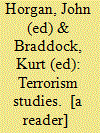|
|
|
Sort Order |
|
|
|
Items / Page
|
|
|
|
|
|
|
| Srl | Item |
| 1 |
ID:
172059


|
|
|
|
|
| Summary/Abstract |
Terrorism researchers have long sought to identify methods for challenging terrorist ideologies. The construction and dissemination of counternarratives has begun to receive substantial attention as a means of doing so. However, the effectiveness of this approach is contingent on message targets' trust in the counternarrative's content and source. This article draws from literatures on trust and online source credibility to offer preliminary guidelines for cultivating trust in counternarratives and their sources. By encouraging trust in this manner, practitioners can reduce the likelihood that their counternarratives will be dismissed by their intended audiences—a perpetual challenge to strategic messaging geared toward countering violent extremism.
|
|
|
|
|
|
|
|
|
|
|
|
|
|
|
|
| 2 |
ID:
095296


|
|
|
|
|
| Publication |
2010.
|
| Summary/Abstract |
Renewed interest on how and why terrorism ends has emerged in parallel with increased visibility of some new and innovative approaches to counterterrorism. These are collectively known, whether for good or bad, as "de-radicalization programs." However, and despite their popularity, data surrounding even the most basic of facts about these programs remains limited. This article presents an overview of the results of a one-year pilot study of select de-radicalization programs and investigates critical issues surrounding assessment of their effectiveness and outcomes. We argue that Multi Attribute Utility Technology (MAUT) may offer promise for future empirical assessment of what we prefer to designate "terrorism risk reduction initiatives." Perhaps less obviously, and until more data surrounding the efficacy of such initiatives becomes available, MAUT may also provide a conceptual basis for planning, evaluating, and guiding the development of future such initiatives and may have the unanticipated consequence of facilitating progress by encouraging greater exploration of efforts to change behavior from other contexts.
|
|
|
|
|
|
|
|
|
|
|
|
|
|
|
|
| 3 |
ID:
108747


|
|
|
|
|
| Publication |
Oxon, Routledge, 2012.
|
| Description |
xxiii, 504p.
|
| Standard Number |
9780415455053
|
|
|
|
|
|
|
|
|
|
|
|
Copies: C:1/I:0,R:0,Q:0
Circulation
| Accession# | Call# | Current Location | Status | Policy | Location |
| 056355 | 363.325/HOR 056355 | Main | On Shelf | General | |
|
|
|
|
| 4 |
ID:
144879


|
|
|
|
|
| Summary/Abstract |
Despite widespread recognition that the use of counternarratives is an important strategic component of countering violent extremism, to date, there are no comprehensive guidelines on how to develop and distribute counternarratives to effectively reduce support for terrorism. To redress this, we offer communication and psychology theory-based procedures for (1) analyzing terrorist narratives, (2) constructing counternarratives that challenge terrorist narratives, and (3) disseminating the counternarratives to overcome barriers to persuasion. Analysts and practitioners can use such guidelines in developing counternarratives to reduce support for violent extremism.
|
|
|
|
|
|
|
|
|
|
|
|
|
|
|
|
| 5 |
ID:
188030


|
|
|
|
|
| Summary/Abstract |
Research in several domains has shown that attitudinal inoculation effectively promotes resistance to persuasion. Despite its proven efficacy, inoculation has not been empirically tested as a strategy for preventing the adoption of beliefs and attitudes consistent with violent extremist ideologies. The current study addresses this gap in the literature. In a between-subjects experiment performed in the U.S., participants (N = 357) were exposed to an inoculation message or no-inoculation control message before reading left- or right-wing extremist propaganda. Inoculation positively predicted psychological reactance, which in turn, reduced intention to support the extremist group. Inoculation also negatively predicted perceptions of the extremist group’s credibility, which positively predicted support intention. Neither the apparent source of the inoculation message, nor the ideological focus of the propaganda, moderated any of these relationships. These results effectively extend the scope of inoculation theory into the realm of violent extremism and have implications for the development of messages intended to prevent persuasive outcomes consistent with extremist ideologies.
|
|
|
|
|
|
|
|
|
|
|
|
|
|
|
|
|
|
|
|
|